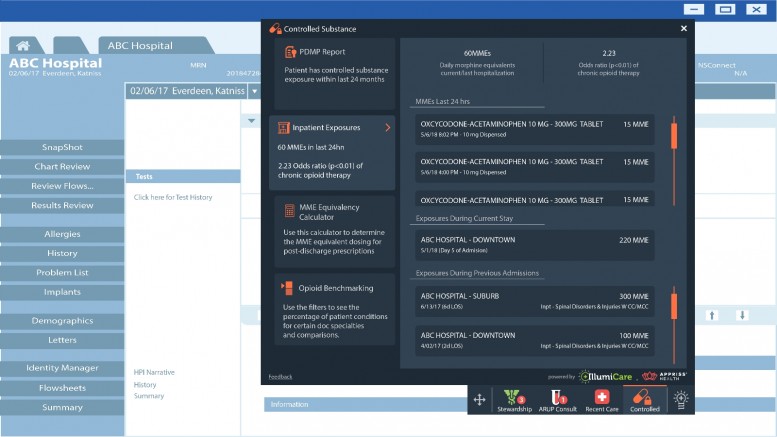The Smart Ribbon removes clinicians’ current blind spot on inpatient exposure, as studies show patients are often first introduced to opioids through the hospital setting
Fifty-one percent of non-surgical patients and most surgical patients receive opioid medications while admitted to a hospital. The amount of morphine equivalent doses received in the hospital affects the odds of a patient’s chronic use of opioids as well. Current tracking solutions don’t show clinicians this inpatient exposure though because they contain only outpatient exposures reported to state Prescription Drug Monitoring Programs (PDMP). To make the best treatment decisions, clinician’s need all full understanding of both inpatient and outpatient exposure. IllumiCare is closing this gap.
To combine all the controlled substance tracking data into one place for quick reference, IllumiCare today announces its Controlled Substance App for the Smart Ribbon. IllumiCare’s Smart Ribbon technology has saved hospitals millions on inpatient admissions as it displays patient-specific risk and cost data unobtrusively within the EHR so clinicians can consider it when making care decisions. Now, the Smart Ribbon can display opioid and other controlled substance data, packaging inpatient and outpatient opioid prescription data into the Ribbon’s easy-to-navigate format. Using the Ribbon, clinicians can make more informed decisions on dosage, alternatives and other important considerations.
The app provides comprehensive information on a patient’s opioid history based on the PDMP, tracks use in the hospital, and shows alerts at peak thresholds of administration. This allows providers to be more judicious in prescribing opioids based on a patient’s history and make better decisions about appropriate dosage.
A recent study made a surprising discovery when looking at the impact of an incomplete view of opioid exposure. After checking the PDMP data, more ER physicians changed their mind and decided to prescribe an opioid versus changing their mind to not prescribe one. The study authors cautioned that the PDMP data is incomplete. But, in this study a “clean” PDMP report overrode the clinicians’ baseline concern about opioids and made them more likely to prescribe opioids.
“While important, accessing only the PDMP gives an incomplete picture of exposure. Tackling the opioid crisis requires hospitals to be more proactive in limiting the inpatient exposure that contributes to a person’s chronic use,” said GT LaBorde, CEO of IllumiCare.
The Texas Hospital Association’s Center for Technology Innovation is one of the first to offer the new app to member hospitals, with its first deployment in the works.
“Texas hospitals are at the forefront of using technology in ways that allow providers to make faster decisions at the point of care with better information,” said Ted Shaw, THA president/ CEO. “Our work with Illumicare is influenced by our perspective on the entire hospital landscape to affect how information can be used to help improve outcomes. This work aligns with our priorities in public policy and education on opioid risk management as a service for our member hospitals and the state of Texas.”

